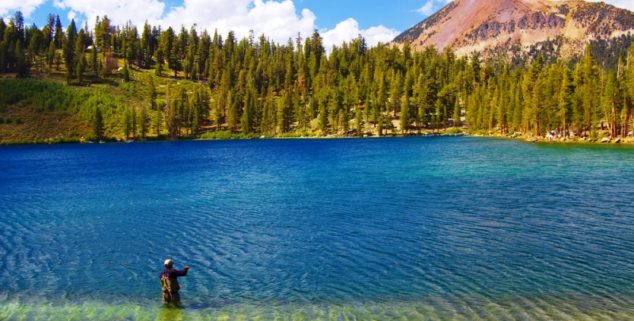Opinion
Post-pandemic, let’s go fishing — with a 365-day license
 An angler at Lake George in the Mammoth Lakes recreation area. (Photo: Justin Mair, via Shutterstock)
An angler at Lake George in the Mammoth Lakes recreation area. (Photo: Justin Mair, via Shutterstock)Recreational fishing has always been the greatest form of social distancing, long before the coronavirus pandemic mandated it.
As Gov. Gavin Newsom faces the immediate challenge of protecting the health and welfare of our state’s citizenry, it is not too early for his administration to give careful consideration to how to rebuild California’s outdoor tourism industry and restore the thousands of jobs lost during this pandemic.
As the governor stated in one of his recent coronavirus daily briefings, he is “passionate” about fishing and recognizes that California has some of the finest fishing in the world – and he is right. Prior to the coronavirus pandemic, recreational fishing in California generated over $4.6 billion in economic activity each year.
Long ago, Californians soured on the notion of purchasing a calendar-based fishing license that expires on Dec. 31 of every year, no matter when purchased.
It is for this reason, an impressive coalition of state and national organizations representing the sportfishing, boating and hospitality industries continues to champion the need to grow fishing participation rates and to pass meaningful fishing license reforms critical to stimulating outdoor tourism.
Even though California has one of the longest coastlines in the country, over 3,000 lakes and thousands of rivers and streams, the nation’s most populous state has the lowest fishing participation rate per capita in the country. The decline did not occur overnight, but the trend was obvious to previous Republican and Democratic administrations that did nothing.
There are two leading contributors to this decline; a calendar-based fishing license that is not valid a full 365-days from the date of purchase and the high cost of fishing.
Long ago, Californians soured on the notion of purchasing a calendar-based fishing license that expires on Dec. 31 of every year, no matter when purchased. If one purchases their license in January, they get 12-months of fishing on their license. If they purchase it in June, they get six months, but still pay full price.
As a consequence, fishing license sales plummet during the late Spring and early Summer months when Californians and tourists hit the water in record numbers. This is when license sales should be exploding, but they are not. Anglers are not interested in paying full price for a license that expires just months later.
In 1980, California’s calendar-based fishing license cost a mere $5. Now California has the distinction of being the costliest state in the country to fish, and the sales of annual fishing license have declined over 55%. Poor offerings and high prices reveal that far too many Californians have simply abandoned fishing altogether.
Declining outdoor activity is also impacting wildlife conservation and fishery programs financed by license fees. Such fees once supported 40% of the California Department of Fish and Wildlife’s (DFW) budget. It was about 20% before the pandemic led the department and some municipalities to restrict fishing in several parts of the state.
It is for this reason, and many others, that there are growing calls for California to follow the lead of reform-minded states that have a proven record of restructuring their licensing programs to include a 365-day fishing license, increased offerings and even reducing fees without placing their wildlife budgets at risk.
In recent years, the DFW has taken measurable steps towards reforming the department’s costly and antiquated licensing program by engaging in a national R3 movement (Recruitment, Retention, Reactivation) that aims to reverse declining fishing participation rates and stimulate outdoor recreation.
In order to help those who have lost their businesses and jobs during this pandemic, DFW needs to implement its R3 Plan immediately and the state Legislature needs to pass AB 1387, Assemblymember Jim Wood’s (D-Santa Rosa) 365-day fishing license bill. Combined, these reforms will provide anglers greater value, motivating Californians to return to the great outdoors and stimulate economic activity when it is needed most.
Too many jobs depend on transitioning Californians from being quarantined at home to enjoying the great outdoors again. There is no time to waste.
—
Ed’s Note: Marko Mlikotin is the executive director of the California Sportfishing League, www.savefishing.com.
Want to see more stories like this? Sign up for The Roundup, the free daily newsletter about California politics from the editors of Capitol Weekly. Stay up to date on the news you need to know.
Sign up below, then look for a confirmation email in your inbox.

Leave a Reply